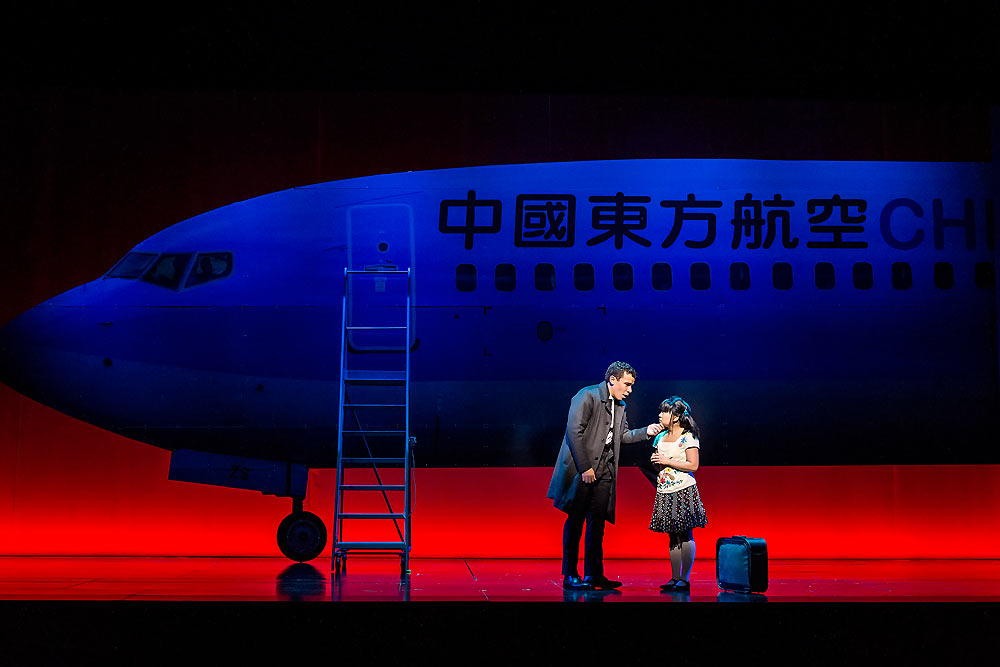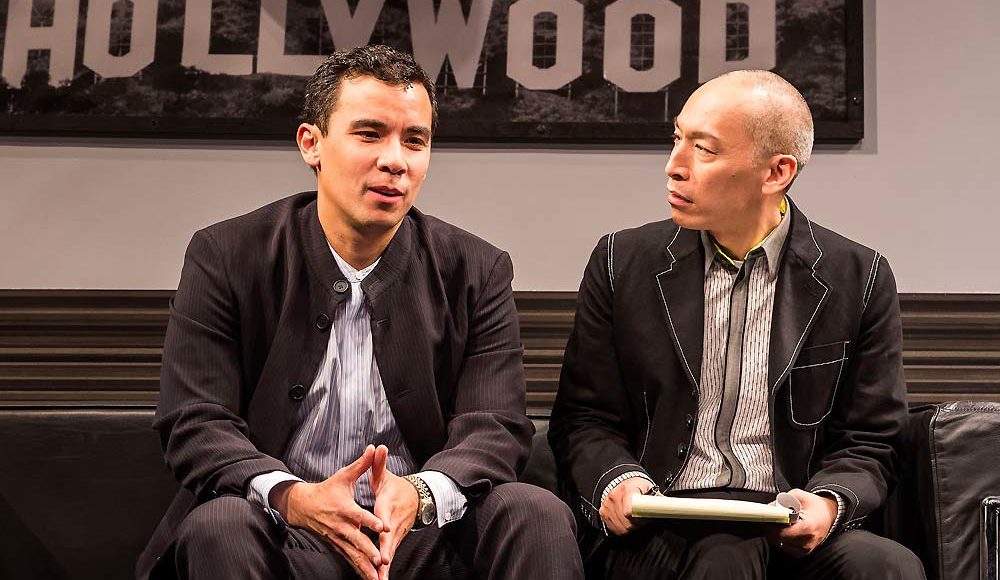by Ernest Kearney — Playwright Henry David Hwang has joined the ranks of an exclusive group.
James Thurber the humorist best known for The Secret Life of Walter Mitty, was six when he was shot in the left eye by a playmate’s arrow. He would go blind in later life, but the impaired vision that plagued him all his days is reflected in his short stories and cartoons which often center on a dubious identification of reality.
Writer John Gardner and his younger brother worked on the family farm in upstate New York after school. His younger brother was killed in a tractor accident when Gardner was at the wheel. The issue of guilt is an undercurrent in much of Gardner’s work, and the event itself is employed as the motivation for a young man becoming a writer in his short piece Redemption.
Stephen King was struck by a minivan while walking on the shoulder of Route 5 in Lovell. Maine. His injuries were serious enough that amputation of his left leg was considered. His 2006 novel, Lisey’s Story grew out of the experience.
English writer Dennis Potter, best known for the British series Pennies From Heaven, suffered from psoriatic arthritis, a form of inflammatory arthritis resulting in crippling psoriasis that would cause his skin to swell, crack and bleed. The condition recurred sporadically during Potter’s adult life leaving him immobile in hospital beds for months at a time. In 1986 Potter’s miniseries The Singing Detective aired starring Michael Gambon as a writer inflicted with the same debilitating disease who escaped the pain by fleeing into a Raymond Chandleresque fantasy.
Anthony Burgess is on record as acknowledging that his wife’s gang rape, in a London blackout, during the Second World War was the seed for his dystopian novel A Clockwork Orange.
In 1932, 17-year-old Jerry Siegel’s father, an immigrant from Lithuania, was working at his Cleveland secondhand clothing store when he was shot to death during an attempted robbery. A few weeks afterward, Siegel sat down with his friend Joe Shuster and began working on a bulletproof comic strip hero named Superman. One of the oldest sketches from that period shows Superman flying to the rescue of a victim of a masked robber.
Much has been made of the correlation between the name of Shakespeare’s son Hammet— who died in August of 1596— and that of Hamlet. Shakespeare, penned no elegy to his son, but in his play King John, likely written right after his death, we find a parent driven to thoughts of suicide by the death of her son. She laments, “Grief fills the room up of my absent child….”
Writers have always harvested their lives for inspiration; their tragedies they’ll pimp.
Tragedy fuels art.
So perhaps it was inevitable that playwright Henry David Hwang’s stabbing in 2015 near his Brooklyn home would end up as material for one of his plays.
Hwang certainly seemed to believe so. When asked during an interview with NBC News in 2016 if the stabbing would affect his writing Hwang answered, “As a writer, everything in your life shows up in your work at some point.”

L-R: Francis Jue, Conrad Ricamora, Austin Ku, Raymond J. Lee, Jaygee Macapugay, Billy Bustamante, Alyse Alan Louis (center), Maria-Christina Oliveras, Geena Quintos, Paul HeeSang Miller, Jon Hoche, Kristen Faith Oei, Daniel May and Kendyl Ito . (Photo by Craig Schwartz – Center Theatre Group/Ahmanson Theatre)
Well that “point” had its world premiere at the Ahmanson (running May 3 to June 10) with Soft Power, very appropriately described as “A play with a musical.”
Soft Power opens with a pretty straightforward shuffling of the deck, the cards of which are drawn from playwright Hwang’s own experiences.
A successful Chinese-American writer DHH (the playwright’s doppelganger, ably played by Francis Jue) is in negotiations with a Chinese film mogul, Xue Xing (Conrad Ricamora) who is interested in doing a “Sex In the City” style movie set in Shanghai, except in the Chinese film, the producer insists, the women will not show the moral laxity of Carrie and company, and all stay in a relationship come good or bad. “Stick with your mistake,” Xue Xing explains.
It’s when DHH tries to explain, that it’s the uncertainty and the emotional messiness of those situations that gave the series its drama that we have the first blip on the theatrical radar of what will be the under towing motif of the evening; “Identity.”
Who are we? Are we that person we see as ourselves or are we trapped in the prison of persona that others erect for us?
For DHH, it begins when Xue Xing slights him for not being “Chinese” enough.
Here the fuse is lite.
It is a short fuse.
Like a practiced slight of hand artist, Hwang stacks his deck in front of his audience, breaking the fourth wall repeatedly to address them as a means of “misdirection.”
After their meeting DHH and Xue Xing attend a performance of The King and I, where they are joined by the married Xue Xing’s American girl friend Zoe (Alyse Alan Louis). Left alone when Xue Xing goes off momentarily, Zoe and DHH interact and again the topic of identity is touched upon; because whereas DHH is simply entranced by the crafted theatricality of the work, Zoe challenges it on a social-political level, commenting on the fact that “The locals speak with their silly accents in their own country.”
Xue Xing returns all titillated by having chanced on a fundraising event for Hillary Clinton’s presidential campaign against “that TV performer with all the bankruptcies.” When DHH departs, Xue Xing and Zoe fall into a discussion of their relationship, and again the issue of “identity” rears its head.
However here, as it has built throughout Hwang’s play, the issue is not objectified in a singular state onstage, but passed through the prism of the playwright’s intent and deflected in a fashion that while still maintaining the primary motif, does impart a sense of disarrangement.
Now between Zoe and Xue Xing, the question of “identity” is amplified beyond just who they are as it regards their relationship, but who they are in the context of national identity; who is Xue Xing in the context of his ancestry, in regard to how his young daughter views him, even in Zoe’s inability to pronounce his name.
The scene seems to come to an abrupt end, but then it shifts to DHH who relates to the audience the incident that will result in fuse meeting powder, and it is another event taken directly from the playwright’s own life, the 2015 stabbing near his home in Brooklyn which severed his vertebral artery and required him to undergo surgery.
Like Alice before him, the potent combination of shock, blood loss and anesthetic delirium provide DHH and the audience with a rabbit hole to go tumbling down— and things do get a little…odd.
To begin, much like another memorable stabbing victim in a shower scene, we lose DHH as the primary character and Xue Xing steps into the gap. He becomes the center of Hwang’s inquiry into the burden of identity, but now the stakes go up some.

Conrad Ricamora and Kendyl Ito in the world premiere of David Henry Hwang and Jeanine Tesori’s “Soft Power” (Photo by Craig Schwartz/ Center Theatre Group/Ahmanson Theatre)
Xue Xing leaves his beloved homeland and his adoring daughter Jing (Kendyl Ito in a delightful scene stealing turn), then he boards a flight to America.
Playwright Hwang may be as American as apple pie and the fortune cookie, but he unquestionably captures the Chinese perspective of this country and translates that to the stage with a stylish vengeance.
Landing at the “Hollywood Airport” Xue Xing is immediately confronted by criminality, unbridled capitalism and guns. Lots of guns. In fact, everybody except Xue Xing is packing. And blond.
Suddenly that rabbit hole begins to morph into Dorothy’s black and white twister. America, as viewed through Hwang’s ether-soaked looking glass, is an over the top MGM “all singing-all dancing” western directed by a meth’d-out Busby Berkley done in three-strip Technicolor.
Xue Xing goes to meet DHH at Hollywood’s most prestigious restaurant – with a décor enhanced by the towering “golden arches” where, by coincidence, Hillary Clinton (Louis incarnated) is holding a political fund raiser. A high kicking, hellzapoppin’ fundraiser, where Hillary enters atop an insanely big “Big Mac” and dances like a soft shoeing Tasmanian Devil unfurling right into Wonder Woman… golden bracelets and all.
If there was any doubt, it is now official; we are no longer in Kansas.
Where we are is in a dizzyingly madcap political opus accented by an existential preoccupation with the nature of “identity”; an opus that is by turns dazzlingly insightful, frustrating, convoluted, inspiring, thoroughly entertaining and undeniably brilliant.
To speak of the staging, one should first begin with “Wow.” Then just repeat that about twenty more times.
Director Leigh Silverman deftly rides the oversized unicycle with which the playwright has presented her, while keeping every single plate spinning. Sam Pinkleton’s choreography manages to capture the styles of the Great White Way to La-La-Land suave and everything in-between; while the sets of David Zinn effect a triptych one-part Broadway, one-part Las Vegas, and one-part bad acid flashback.
The other triptych to note is that of Ricamora, Louis and Jue.
Ricamora was a joyful surprise. An actor being on a popular series, in this case How To Get Away With Murder One, can cause expectations to be lower, especially if unaware of their background. Ricamora commanded the stage with his presence, a stage that would have chewed up and spat out a lesser talent.
Louis carries the most demanding arc-shifts of the show and does so with aplomb, while taking the stage like Gwen Verdon fired out of a cannon.
Jue is the eye at the storm’s center, and when at times it feels like that storm just may sweep away everything in its path, Jue is the anchor that secures all with his humanity.
Soft Power is an amazing show, and the flaws of the show all stem from an excess of what serves to make it amazing.
An overall superb score by Hwang and Jeanine Tesori may need a trim.
The abrupt presentation of some scenes and the topsy-turvy structuring of the piece may confound some, though being faithful to the nature of nightmares.
There is the jarring opening of the second act where we learn from a panel of Chinese scholars and descendents of its participants that most of the first act we’ve watched is a film of the events that has heralded China’s dominance on the global scene. Which calls into question again the identities of those we were watching as well as our own.
Whether it would be a benefit to drop this scene or introduce it earlier is a question for others to take up.
One, of course, can nitpick any work of theatre. * ![]() *
*
Hwang sees that the concern with “identity” continues to reverberate, restating until there is not one level of the show’s story or one inch of the Ahmanson’s stage over which it doesn’t resonate.
What defines one’s identity: our heritage, our families, who we love, our race, our image, our nationalities, our political leaders?
The motif begins to narrow as to what defines an American, and finally when Jue returns to take center stage we come to some conclusions.
An American is not a race or religion, and certainly not the administration of his “Accidency.”
What confirms an American is the acceptance of the rule of law, the commitment to extending to all others those rights you claim for yourself and a faith that the remedy for all the ills of our democracy is found in more democracy.
It is this final declaration delivered with bravado by Louis in the eleventh hour number in which DHH reaffirms his faith in America and gives us cause to retain ours. Again, too, the issue of identity returns as Hwang encourages us, in the most Chinese of imagery, “To lose your face and open your heart.”
Our national face of the moment is that which our leader presents to the world, and is well worth the losing, and its loss necessitates that we reopen our hearts to the world and our fellow citizens.
Hwang has achieved in Soft Power a work of great entertainment that also succeeds in being the deftest declaration of defiance to the current regime and the political climate it has generated. And fittingly, it comes down to identity again.
Yes, there is an 800-pound – make that a 1243-pound, orange-thatched, small-handed gorilla on the stage, whose name is never once uttered.
Hwang took this conceit from the nameless monarch of The King and I, and audaciously applies it to declare to all that this nonentity is not us, that it is not America, and that this too will pass.
This in my book is worth the price of a ticket.
And the Pulitzer.
♦ ♦ ♦
* ![]() * ”Hey, its five hours long! And how old is this prince of Denmark supposed to be anyways?”
* ”Hey, its five hours long! And how old is this prince of Denmark supposed to be anyways?”
Soft Power runs at the Ahmanson through June 10. Visit the Website for Schedule and Ticket information.
Like us on Facebook
Follow us on Twitter @theTVolution
Please Subscribe to our Newsletter
(Box on the Left Rail)
We Thank You for Supporting the Voices of TheTVolution





